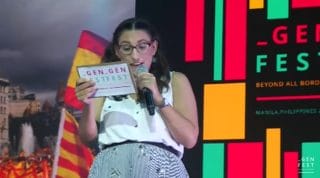
Aug 13, 2018 | Focolare Worldwide
 The referendum for independence held in Catalonia (Spain) on 1 October 2017, declared as illegal, gave rise to a season of strong political and social unrest and civil tension which directly involved all the sectors of the population, above all, the youth. Martì is Catalonian and comes from a city near Barcelona, but moved to Madrid for his studies. As a Gen, he shares the Focolare ideals of unity with other young people of various regions of Spain and recounted that “despite this common value, also with them in the first three months in Madrid, it had not been easy. Furthermore in the residence where I live I was maltreated because I was the only Catalonian. I held many discussions with the Gen and we continuously ended up getting angry. But one day, we decided to resolve this situation by talking among ourselves and really listening to one another. We began to see that this was the most important thing we had to do: go beyond our ideas and not foregoing dialogue amongst us, since the most important thing was to understand and respect one another. I can’t say that from then on the path was simpler, but we understood that problems are solved when we set ourselves in the condition of really listening, and not wanting to impose ourselves, the.
The referendum for independence held in Catalonia (Spain) on 1 October 2017, declared as illegal, gave rise to a season of strong political and social unrest and civil tension which directly involved all the sectors of the population, above all, the youth. Martì is Catalonian and comes from a city near Barcelona, but moved to Madrid for his studies. As a Gen, he shares the Focolare ideals of unity with other young people of various regions of Spain and recounted that “despite this common value, also with them in the first three months in Madrid, it had not been easy. Furthermore in the residence where I live I was maltreated because I was the only Catalonian. I held many discussions with the Gen and we continuously ended up getting angry. But one day, we decided to resolve this situation by talking among ourselves and really listening to one another. We began to see that this was the most important thing we had to do: go beyond our ideas and not foregoing dialogue amongst us, since the most important thing was to understand and respect one another. I can’t say that from then on the path was simpler, but we understood that problems are solved when we set ourselves in the condition of really listening, and not wanting to impose ourselves, the. 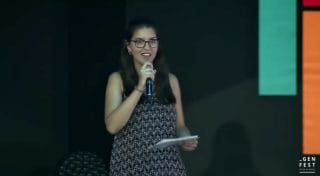 Alba is also Catalonian and recounted that the post-referendum period was a real test for her and for the other gen: on the social media some Gen had written their strong convictions about the political ideas of one or the other party, which hurt me deeply, but I didn’t stop to think whether my way of expressing myself could hurt those who do share my ideas. It was in those days that I started reflecting on what it meant for us, who often say that we are even ready to die for each other. When would we have to put this promise in practice? I felt that the time was now.
Alba is also Catalonian and recounted that the post-referendum period was a real test for her and for the other gen: on the social media some Gen had written their strong convictions about the political ideas of one or the other party, which hurt me deeply, but I didn’t stop to think whether my way of expressing myself could hurt those who do share my ideas. It was in those days that I started reflecting on what it meant for us, who often say that we are even ready to die for each other. When would we have to put this promise in practice? I felt that the time was now.  So we met up with all the gen from all of Spain to clarify things even if it was not easy since we were a big group and it was impossible to say all we felt. We continued to speak with some of them, like Laura. I remember that with her the situation was delicate because I did not know how we could face the problem without hurting each other. When she proposed to make a pact, that is, of putting love before everything else, I was taken off my feet! No one had ever proposed a similar thing to me but it worked because from that moment on we managed to dialogue. The objective was not to defend our ideas, but to take care of one another, and at the same time, leave room for free expression. This experience made me see the political situation differently, and understand that what matters is not to be on the reasonable side, but that beyond the ideas there is always the person and this is more important. Still today our opinions have not changed: we think differently and this is not easy. At times we have to ask excuse, but in talking, we reach the conclusion that both the positive and negative things are part of experience. The misunderstanding now has been transformed into something greater: it is not resignation, or only respect. It is that rose which is worth more than all the thorns put together.”
So we met up with all the gen from all of Spain to clarify things even if it was not easy since we were a big group and it was impossible to say all we felt. We continued to speak with some of them, like Laura. I remember that with her the situation was delicate because I did not know how we could face the problem without hurting each other. When she proposed to make a pact, that is, of putting love before everything else, I was taken off my feet! No one had ever proposed a similar thing to me but it worked because from that moment on we managed to dialogue. The objective was not to defend our ideas, but to take care of one another, and at the same time, leave room for free expression. This experience made me see the political situation differently, and understand that what matters is not to be on the reasonable side, but that beyond the ideas there is always the person and this is more important. Still today our opinions have not changed: we think differently and this is not easy. At times we have to ask excuse, but in talking, we reach the conclusion that both the positive and negative things are part of experience. The misunderstanding now has been transformed into something greater: it is not resignation, or only respect. It is that rose which is worth more than all the thorns put together.”
https://youtu.be/YwMdvyhDJeA?t=1428
Aug 12, 2018 | Focolare Worldwide
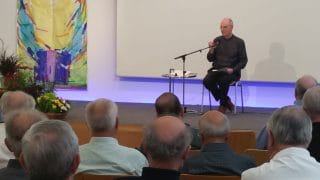
Aug 9, 2018 | Focolare Worldwide
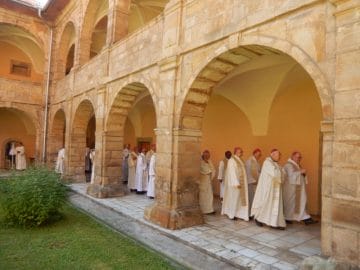 “We were invited to this enchanting place, the “green heart” of Austria, by Bishop Wilhelm Krautwaschl, current bishop of this 800 year-old diocese,” writes Thailand’s Cardinal Francis Xavier Kriengsak, who is coordinator of the Bishop Friends of the Focolare Movement. “For us, this this stay was an opportunity to live together as brothers, to share each other’s joys and sorrows, to regenerate our strength and to anchor ourselves once again in the essential.” History: The first meeting of Bishop Friends of the Focolare was held in 1977 upon the invitation of theologian Klaus Hemmerle (1929 – 1994), once bishop of Aquisgrana, Germany. That time, the meeting was attended by twelve bishops from five continents. At the General Audience in the Vatican, Pope Paul VI greeted them and encouraged them to go forward. At the next meeting when he met them for the last time, he said: “As the head of the Apostolic College, I strongly encourage you, I urge you, I exhort you to continue in this undertaking.” The same encouragement arrived from successive popes, including Pope Francis who sent his personal greetings. In 1981 these summer vacations with a small group of bishops were began. In 1984, Chiara Lubich invited them to “decisively launch themselves, along with the whole Work of Mary, towards the unity of the churches and dialogue with other religions and people of good will” in accordance with the Church’s and the Focolare spirituality’s objective. The bishops write: “That invitation provoked a leap in quality in our communion [with one another].”
“We were invited to this enchanting place, the “green heart” of Austria, by Bishop Wilhelm Krautwaschl, current bishop of this 800 year-old diocese,” writes Thailand’s Cardinal Francis Xavier Kriengsak, who is coordinator of the Bishop Friends of the Focolare Movement. “For us, this this stay was an opportunity to live together as brothers, to share each other’s joys and sorrows, to regenerate our strength and to anchor ourselves once again in the essential.” History: The first meeting of Bishop Friends of the Focolare was held in 1977 upon the invitation of theologian Klaus Hemmerle (1929 – 1994), once bishop of Aquisgrana, Germany. That time, the meeting was attended by twelve bishops from five continents. At the General Audience in the Vatican, Pope Paul VI greeted them and encouraged them to go forward. At the next meeting when he met them for the last time, he said: “As the head of the Apostolic College, I strongly encourage you, I urge you, I exhort you to continue in this undertaking.” The same encouragement arrived from successive popes, including Pope Francis who sent his personal greetings. In 1981 these summer vacations with a small group of bishops were began. In 1984, Chiara Lubich invited them to “decisively launch themselves, along with the whole Work of Mary, towards the unity of the churches and dialogue with other religions and people of good will” in accordance with the Church’s and the Focolare spirituality’s objective. The bishops write: “That invitation provoked a leap in quality in our communion [with one another].” 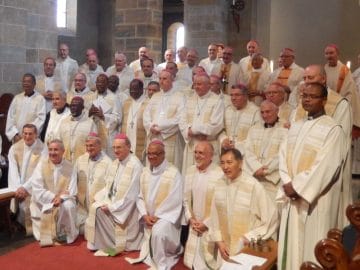 This year 63 prelates from 31countries attended, including Lutheran bishop Christian Krause, once president of the World Lutheran Federation. The goal was the same as always: “to enter more deeply and live the spirituality of communion” and to “explore the ways it could strengthen the Church’s journey” in various socio-cultural circumstances. The setting was the beautiful Palace of Seggau (XII century), ancient seat of the Bishop of Graz and now transformed into a conference centre immersed in lush green surroundings. The meeting opened amidst much joy and fraternity, they write, “with a review the beginnings of the bishops’ participation in the charism of unity, which has led them to aim for a life of communion not only during summer vacation, but also at a distance and throughout the whole year.”
This year 63 prelates from 31countries attended, including Lutheran bishop Christian Krause, once president of the World Lutheran Federation. The goal was the same as always: “to enter more deeply and live the spirituality of communion” and to “explore the ways it could strengthen the Church’s journey” in various socio-cultural circumstances. The setting was the beautiful Palace of Seggau (XII century), ancient seat of the Bishop of Graz and now transformed into a conference centre immersed in lush green surroundings. The meeting opened amidst much joy and fraternity, they write, “with a review the beginnings of the bishops’ participation in the charism of unity, which has led them to aim for a life of communion not only during summer vacation, but also at a distance and throughout the whole year.”  There were several presentations. Fr Fabio Ciardi, OMI, who is head of the Abba School, offered several reflections on Chiara Lubich’s experience of light in 1949. Archbishop Vincenzo Zan, Secretary of the Congregation for Catholic Education, described the Synod on young people that will take place in October. Bishop Brendan Leahy from Ireland reported on the Meeting of Families that will be held in Dublin at the end of August. Focolare president, Maria Voce, anticipated the topic that will be explored by all the Focolare members throughout the next year: “The Holy Spirit, Soul of the Church and of the world.” Then, together with co-president Jesús Morán, she talked about their visit to several Asian countries last January where they met with communities of the Movement. They also described the recent large gathering of young people at the Genfest in Manila, Philippines. They listened again to the Pope’s speech at the Focolare town of Loppiano, Italy, on May 10th, which Moran described as a “kind of guidebook” for the Work of Mary’s journey.” The Governor of the region welcomed the bishops in the Main Hall of the university of the Jesuits and offered them a reception. This is an unprecedented event, he remarked, which places us in the good collaboration between civil institutions and the church “in an ecumenical spirit and openness to all religions.”
There were several presentations. Fr Fabio Ciardi, OMI, who is head of the Abba School, offered several reflections on Chiara Lubich’s experience of light in 1949. Archbishop Vincenzo Zan, Secretary of the Congregation for Catholic Education, described the Synod on young people that will take place in October. Bishop Brendan Leahy from Ireland reported on the Meeting of Families that will be held in Dublin at the end of August. Focolare president, Maria Voce, anticipated the topic that will be explored by all the Focolare members throughout the next year: “The Holy Spirit, Soul of the Church and of the world.” Then, together with co-president Jesús Morán, she talked about their visit to several Asian countries last January where they met with communities of the Movement. They also described the recent large gathering of young people at the Genfest in Manila, Philippines. They listened again to the Pope’s speech at the Focolare town of Loppiano, Italy, on May 10th, which Moran described as a “kind of guidebook” for the Work of Mary’s journey.” The Governor of the region welcomed the bishops in the Main Hall of the university of the Jesuits and offered them a reception. This is an unprecedented event, he remarked, which places us in the good collaboration between civil institutions and the church “in an ecumenical spirit and openness to all religions.”
Aug 9, 2018 | Focolare Worldwide
While tens of thousands of youths from almost 200 dioceses throughout Italy are on their way to Rome for the meeting with Pope Francis on 11-12 August, the two-day programme was presented. About 70,000 young people will meet the Pope on Saturday at the Circo Massimo, for a “face-to-face” dialogue, to be followed by a prayer-wake in the spirit of the synod of October dedicated expressly to the youth. During the night some Churches along the Circo Massimo-St. Peter route will remain open not only for personal and community prayers, and confessions, but also testimonials, performances and theme encounters. On Sunday morning in St. Peter’s Square, Mass will be celebrated, followed by a new meeting with Pope Francis who will consign his missionary mandate to the youths and bless the gifts which the Italian delegation will bring to the World Youth Day in Panama in January 2019.
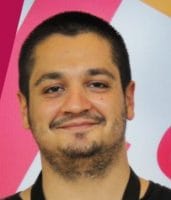
Aug 8, 2018 | Focolare Worldwide

Tommaso Carrieri, co-founder of the association “Not from war”
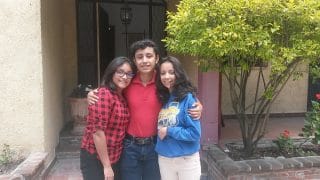
Aug 7, 2018 | Focolare Worldwide
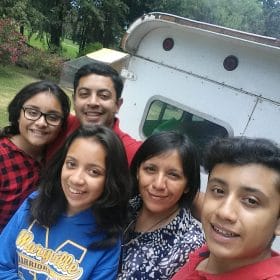 Together with their three children, four years ago Edgar and Maquency moved to “El Diamante”, the Focolare’s little city 50 kilometers from Puebla, and close to 170 kilometers from Mexico City. Although only a couple of dozen inhabitants, each year a few thousand visitors come to this land, which has a culture of sharp contrasts, including modern, well-populated cities and vast surrounding areas. The little city is a true point of a diamond, the beating heart of the Focolare Movement that Chiara Lubich founded in 1990. It is a place that bears witness to how Gospel life can become enculturated if it is based on dialogue and mutual exchange between diverse cultures. “We decided to move to the little city with our three children to contribute in a practical way. We landed here after responding to a real and true call from God to build the city togethe rwith others,” says Edgar. “For us, making ourselves available was a way to pay back all the love that has been given us ever since we heard about the ideal of unity,” Maquency adds. “Recently,” says Edgar, “we were trying to make ends meet, which was difficult without having a steady job. During our first year in the little city, I had different carpentry and plumbing jobs, and then I worked as a house painter to support our family. After that, discussing it with Maquency and the other focolarini, we decided I would go and search for other income in my field, engineering. After some time, I found a job in a city 90 kilometers from the little city. The work was good, and I was happy, but there was always that feeling that I was far away from home, my family and the little city.” Then another opportunity arose in a nearby city. “Talking about ita t home, we decided to accept the job. At first it seemed a good option, but after a few months of working at that business, I realised that things were not quite what they seemed and gave my notice. “I then went back to the little city and dedicated myself to silk-screen printing. It felt like I had gone backwards. “Instead just after that, an unexpected job offer came up as a consultant for a project. I was immediately hired, and I really enjoyed the work and the pay was good. Finally we were able to have financial stability in our family.”
Together with their three children, four years ago Edgar and Maquency moved to “El Diamante”, the Focolare’s little city 50 kilometers from Puebla, and close to 170 kilometers from Mexico City. Although only a couple of dozen inhabitants, each year a few thousand visitors come to this land, which has a culture of sharp contrasts, including modern, well-populated cities and vast surrounding areas. The little city is a true point of a diamond, the beating heart of the Focolare Movement that Chiara Lubich founded in 1990. It is a place that bears witness to how Gospel life can become enculturated if it is based on dialogue and mutual exchange between diverse cultures. “We decided to move to the little city with our three children to contribute in a practical way. We landed here after responding to a real and true call from God to build the city togethe rwith others,” says Edgar. “For us, making ourselves available was a way to pay back all the love that has been given us ever since we heard about the ideal of unity,” Maquency adds. “Recently,” says Edgar, “we were trying to make ends meet, which was difficult without having a steady job. During our first year in the little city, I had different carpentry and plumbing jobs, and then I worked as a house painter to support our family. After that, discussing it with Maquency and the other focolarini, we decided I would go and search for other income in my field, engineering. After some time, I found a job in a city 90 kilometers from the little city. The work was good, and I was happy, but there was always that feeling that I was far away from home, my family and the little city.” Then another opportunity arose in a nearby city. “Talking about ita t home, we decided to accept the job. At first it seemed a good option, but after a few months of working at that business, I realised that things were not quite what they seemed and gave my notice. “I then went back to the little city and dedicated myself to silk-screen printing. It felt like I had gone backwards. “Instead just after that, an unexpected job offer came up as a consultant for a project. I was immediately hired, and I really enjoyed the work and the pay was good. Finally we were able to have financial stability in our family.”  When everything seemed to become normal from the financial point of view, Edgar was surprised to be asked to manage the maintenance in the little city, which was quite needed so many years after being built. “My wife and I entered into a new phase of discernment, trying to understand the right choice to make. There were moments of uncertainty and worry, especially when we thought of our children’s future.” “We remembered,” Maquency says, “our early experience that God had us live through. We felt we were being asked yet again, since when God calls, he asks to leave everything and demands an. Exclusive love. He wants us to leave our security in order to put ourselves at the service of others. Yet he also offers us everything, as the Gospel says: ‘No one who has left home or brothers or sisters or mother or father or children or fields for my sake and for the Gospel will fail to receive a hundredfold in the present age.’” “And so we decided that I’d put myself at the service of the little city. When I discussed it with my manager at the business, he exclaimed, ‘If only there were many people like you!’ and he proposed that I work for reduced hours, which matched my needs. I experienced how Providence intervened firsthand and how true the Gospel is.”
When everything seemed to become normal from the financial point of view, Edgar was surprised to be asked to manage the maintenance in the little city, which was quite needed so many years after being built. “My wife and I entered into a new phase of discernment, trying to understand the right choice to make. There were moments of uncertainty and worry, especially when we thought of our children’s future.” “We remembered,” Maquency says, “our early experience that God had us live through. We felt we were being asked yet again, since when God calls, he asks to leave everything and demands an. Exclusive love. He wants us to leave our security in order to put ourselves at the service of others. Yet he also offers us everything, as the Gospel says: ‘No one who has left home or brothers or sisters or mother or father or children or fields for my sake and for the Gospel will fail to receive a hundredfold in the present age.’” “And so we decided that I’d put myself at the service of the little city. When I discussed it with my manager at the business, he exclaimed, ‘If only there were many people like you!’ and he proposed that I work for reduced hours, which matched my needs. I experienced how Providence intervened firsthand and how true the Gospel is.”

 The referendum for independence held in Catalonia (Spain) on 1 October 2017, declared as illegal, gave rise to a season of strong political and social unrest and civil tension which directly involved all the sectors of the population, above all, the youth. Martì is Catalonian and comes from a city near Barcelona, but moved to Madrid for his studies. As a Gen, he shares the Focolare ideals of unity with other young people of various regions of Spain and recounted that “despite this common value, also with them in the first three months in Madrid, it had not been easy. Furthermore in the residence where I live I was maltreated because I was the only Catalonian. I held many discussions with the Gen and we continuously ended up getting angry. But one day, we decided to resolve this situation by talking among ourselves and really listening to one another. We began to see that this was the most important thing we had to do: go beyond our ideas and not foregoing dialogue amongst us, since the most important thing was to understand and respect one another. I can’t say that from then on the path was simpler, but we understood that problems are solved when we set ourselves in the condition of really listening, and not wanting to impose ourselves, the.
The referendum for independence held in Catalonia (Spain) on 1 October 2017, declared as illegal, gave rise to a season of strong political and social unrest and civil tension which directly involved all the sectors of the population, above all, the youth. Martì is Catalonian and comes from a city near Barcelona, but moved to Madrid for his studies. As a Gen, he shares the Focolare ideals of unity with other young people of various regions of Spain and recounted that “despite this common value, also with them in the first three months in Madrid, it had not been easy. Furthermore in the residence where I live I was maltreated because I was the only Catalonian. I held many discussions with the Gen and we continuously ended up getting angry. But one day, we decided to resolve this situation by talking among ourselves and really listening to one another. We began to see that this was the most important thing we had to do: go beyond our ideas and not foregoing dialogue amongst us, since the most important thing was to understand and respect one another. I can’t say that from then on the path was simpler, but we understood that problems are solved when we set ourselves in the condition of really listening, and not wanting to impose ourselves, the.  Alba is also Catalonian and recounted that the post-referendum period was a real test for her and for the other gen: on the social media some Gen had written their strong convictions about the political ideas of one or the other party, which hurt me deeply, but I didn’t stop to think whether my way of expressing myself could hurt those who do share my ideas. It was in those days that I started reflecting on what it meant for us, who often say that we are even ready to die for each other. When would we have to put this promise in practice? I felt that the time was now.
Alba is also Catalonian and recounted that the post-referendum period was a real test for her and for the other gen: on the social media some Gen had written their strong convictions about the political ideas of one or the other party, which hurt me deeply, but I didn’t stop to think whether my way of expressing myself could hurt those who do share my ideas. It was in those days that I started reflecting on what it meant for us, who often say that we are even ready to die for each other. When would we have to put this promise in practice? I felt that the time was now.  So we met up with all the gen from all of Spain to clarify things even if it was not easy since we were a big group and it was impossible to say all we felt. We continued to speak with some of them, like Laura. I remember that with her the situation was delicate because I did not know how we could face the problem without hurting each other. When she proposed to make a pact, that is, of putting love before everything else, I was taken off my feet! No one had ever proposed a similar thing to me but it worked because from that moment on we managed to dialogue. The objective was not to defend our ideas, but to take care of one another, and at the same time, leave room for free expression. This experience made me see the political situation differently, and understand that what matters is not to be on the reasonable side, but that beyond the ideas there is always the person and this is more important. Still today our opinions have not changed: we think differently and this is not easy. At times we have to ask excuse, but in talking, we reach the conclusion that both the positive and negative things are part of experience. The misunderstanding now has been transformed into something greater: it is not resignation, or only respect. It is that rose which is worth more than all the thorns put together.”
So we met up with all the gen from all of Spain to clarify things even if it was not easy since we were a big group and it was impossible to say all we felt. We continued to speak with some of them, like Laura. I remember that with her the situation was delicate because I did not know how we could face the problem without hurting each other. When she proposed to make a pact, that is, of putting love before everything else, I was taken off my feet! No one had ever proposed a similar thing to me but it worked because from that moment on we managed to dialogue. The objective was not to defend our ideas, but to take care of one another, and at the same time, leave room for free expression. This experience made me see the political situation differently, and understand that what matters is not to be on the reasonable side, but that beyond the ideas there is always the person and this is more important. Still today our opinions have not changed: we think differently and this is not easy. At times we have to ask excuse, but in talking, we reach the conclusion that both the positive and negative things are part of experience. The misunderstanding now has been transformed into something greater: it is not resignation, or only respect. It is that rose which is worth more than all the thorns put together.” 

 “We were invited to this enchanting place, the “green heart” of
“We were invited to this enchanting place, the “green heart” of 


 Together with their three children, four years ago Edgar and Maquency moved to
Together with their three children, four years ago Edgar and Maquency moved to